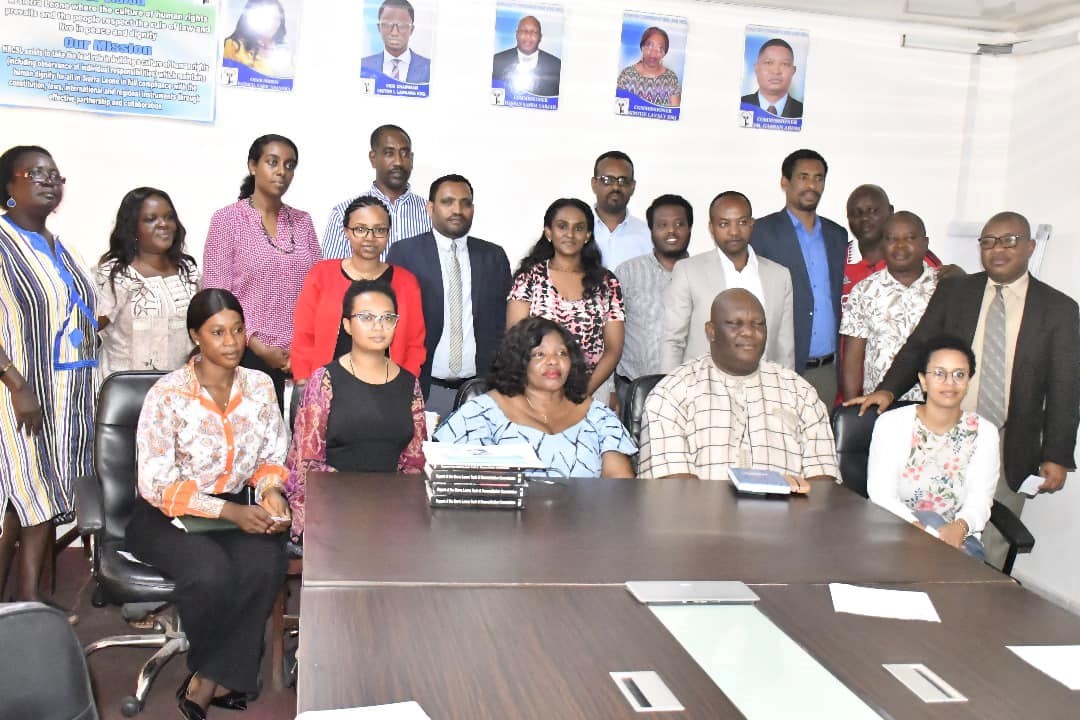AYV News, August 22, 2023
The Human Rights Commission of Sierra Leone (HRC-SL) has hosted the Ethiopian Delegation on Transitional Justice at the Headquarters of the Commission, Tower Hill, Freetown.
The 13-man delegation comprises members of an independent committee of Transitional Justice and the Human Rights Commission of Ethiopia.
According to Kalkidan Dereje a member of the Transitional Working Group of Experts who spoke on behalf of the Head of the Delegation, the purpose of the visit was to conduct a study mission to the country to better understand the setting up and operationalization of a transitional justice mechanism and how it impacts a post-conflict nation.
She stated that the Ethiopian Government is trying to have a lasting solution to human rights violations and injustices in their country and has therefore chosen the path of transitional justice through a comprehensive and holistic transitional justice policy framework.” She added that it was along those lines that the Ministry of Justice established an independent and impartial transitional working group of experts that is responsible to craft the policy.
Responding on behalf of the Commission, Chairperson Madam Patricia Narsu Ndanema did a PowerPoint presentation on the Background to the transitional justice mechanism in Sierra Leone and how HRC-SL has since been involved in enhancing the implementation of recommendations of the Truth and Reconciliation Commission Report as well as the challenges recorded so far.
The background discloses efforts made by the government and its partners during the 11 years of civil war to bring an end to the war which included the Lomé Peace Treaty (1999), the establishment of the Truth and Reconciliation Commission (TRC, 2000), and the creation of the Special Court for Sierra Leone (SCSL, 2000).
The Chairperson succinctly explained that while the TRC was primarily charged with the responsibility to create an impartial historic record of the war, address impunity and respond to the needs of the victims among others; the SCSL’s mandate was to try those who bore the greatest responsibility for war crimes and crimes against humanity as a means of discouraging impunity and promoting accountability. She further stated that the Human Rights Commission was established by an Act of Parliament in 2004 consistent with the UN Paris Principles following recommendations from both the Lomé Peace Agreement and the TRC Report.
As a national human rights institution in Sierra Leone, HRCSL’s mandate is to protect and promote human rights of all in the country. Therefore, the institution has been key in the transitional justice processes. (https://www.udenar.edu.co/) According to the Chairperson, section 18 of the TRC Act 2000 makes provision for the establishment of “a committee or other body including the representatives of the Moral Guarantors of the Lomé Peace Agreement” as a follow-up mechanism on the implementation of the recommendations of the TRC Report but regrettably, this Committee has not been constituted despite calls from the Commission to have it established.
However, in 2006 the role of the Follow-up committee as noted by the Chairperson, was verbally assigned to the commission. She said the Commission has since been engaged in public awareness raising, archiving, and regulating access to TRC records. She also elaborated on the Commission’s general operations including monitoring, complaints handling, public education, collaboration and partnerships, providing human rights advisory to the government, etc.
The Chairperson noted that the TRC completed its work by producing four volumes of credible reports containing the historical background and causes of the war, findings, and recommendations for the attention and action of successive governments.
The SCSL equally completed its work by trying those indicted for war crimes and crimes against humanity and left behind a Residual Court which is still in operation in the country.
The presentation was followed by instructive general discussions which further enhanced the understanding of the visiting delegation on the transitional justice history and mechanism in Sierra Leone.

